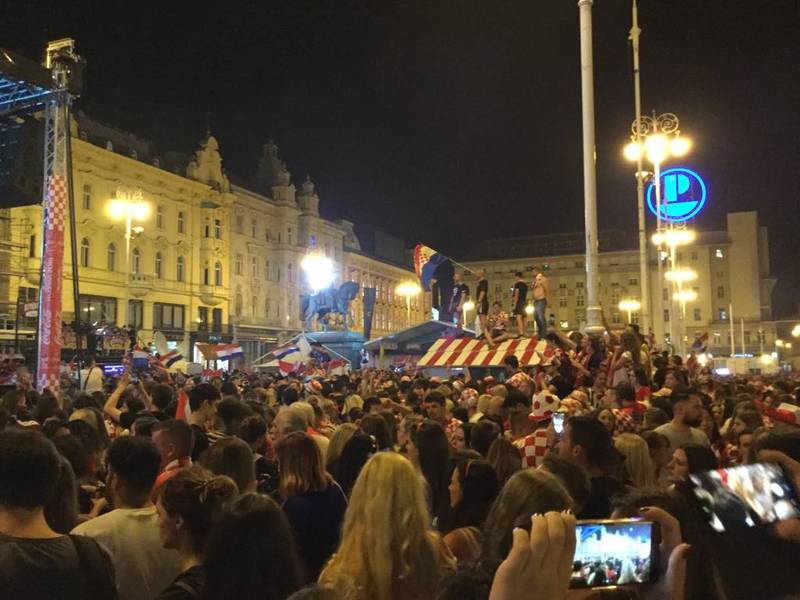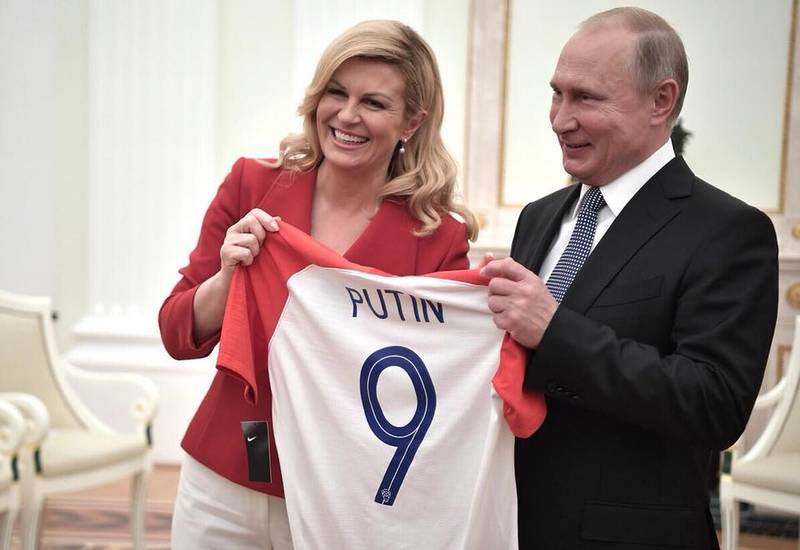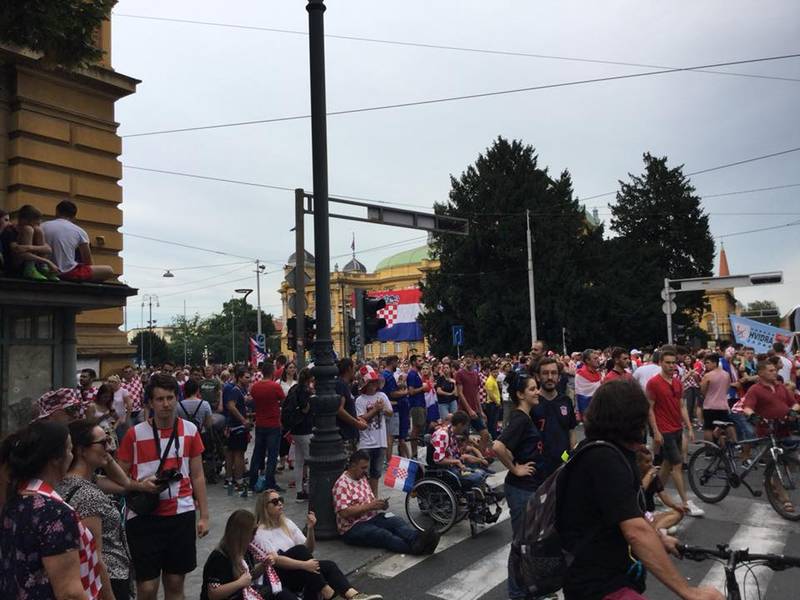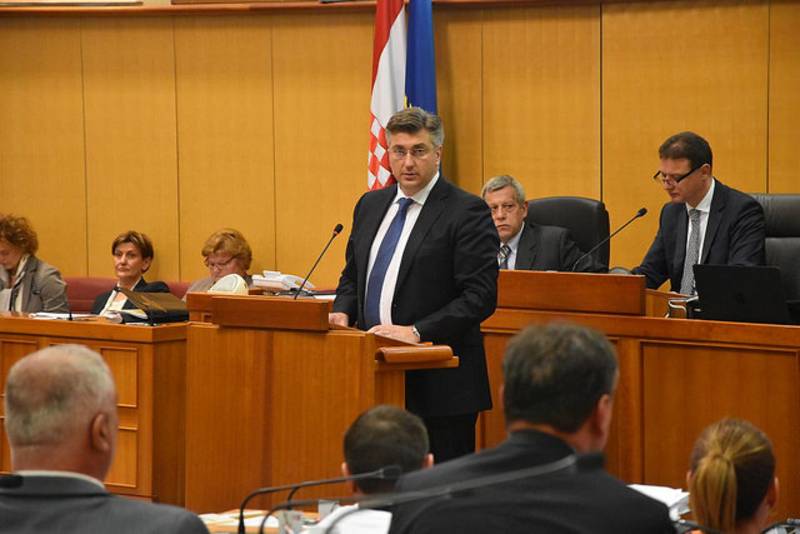Croatia's Nationalistic Paradox*
Adelina Marini, August 6, 2018
 The football World Cup in Russia started with the familiar ethno-nationalism in the region of former Yugoslavia. Then, it evolved into a very rare unity and brotherhood among the peoples in the ex-state to return, again, in the channel of nationalism, leaving bitterness and disappointment behind. However, this return had some hues which distinguished it from the beginning of the championship, and which revealed a weird paradox. In the entire series of popular emotions, Croatian President Kolinda Grabar-Kitarovic's populism reached its peak and, most probably, secured her a second term in office. In her desire to win the love of popular masses around the world and especially at home, Ms Grabar-Kitarovic, probably quite unconsciously, unlocked a reconciliation mode and a desire the bloody past and hatred in the former Yugoslavian countries to be forgotten forever and to open a new page in a region suffering of tangible depopulation.
The football World Cup in Russia started with the familiar ethno-nationalism in the region of former Yugoslavia. Then, it evolved into a very rare unity and brotherhood among the peoples in the ex-state to return, again, in the channel of nationalism, leaving bitterness and disappointment behind. However, this return had some hues which distinguished it from the beginning of the championship, and which revealed a weird paradox. In the entire series of popular emotions, Croatian President Kolinda Grabar-Kitarovic's populism reached its peak and, most probably, secured her a second term in office. In her desire to win the love of popular masses around the world and especially at home, Ms Grabar-Kitarovic, probably quite unconsciously, unlocked a reconciliation mode and a desire the bloody past and hatred in the former Yugoslavian countries to be forgotten forever and to open a new page in a region suffering of tangible depopulation.
How did everything start?
In the beginning, the championship was going, as usually, without much emotion, rather as an entertainment. After all, what can be better than watching the World Cup in the summer, in a touristic country? Every cafй, restaurant or a bar had TV screens indoors and outdoors, huge screens were installed at almost every major square, there were drinks and food everywhere. In other words, a huge summer party. Things started to get serious when Croatia passed into the eliminations phase. More and more viewers were gathering at public squares and in cafйs. Quite frequent were spiteful hints of Croatian viewers aimed at some of the players in the national team regarding their ethnic origin. "Here's the 'real' Croat" or "Why don't you go back to Bosnia", etc.
And those were not just hints. They have a real background. The most vivid example is of the (now) national hero Danijel Subasic, the fantastic doorkeeper of the "Feiry" (Vatreni). He grew up in Zadar, in the family of an Orthodox Christian father with the Serbian name Jovo, and a Catholic mother, called Boja. He grew up at a time when Serbian houses and shops were often set ablaze. As he was treated in the beginning as a half-Croat, Suba had problems, in the beginning of his career in Split, despite his talent, because football was, at the time, and still is, deeply intertwined with politics, and especially with the ruling party Croatian Democratic Union (HDZ), considering itself a creator of the state and having the right of a life-long monopoly over patriotism.
Not only had he problems to reveal his huge talent, but Suba was also in the role of Romeo due to his origin. He fell in love with the "wrong" daughter - Antonia. Her father, Ante, threatened to kill her unless she stopped seeing the half-Croat, Danijel. This same Ante is today a proud father-in-law. Croatian media recently reported that he even boasted among his fellow citizens: "This is my son-in-law! Look, you wretches! This is my son-in-law".
There were advices for Dejan Lovren to go back to Bosnia and Herzegovina. He grew up in Munich after his parents fled the war. Ivan Rakitic's parents, too, are Bosnian Croats, and he himself was born abroad. In short, most players, who made Croatia great again at World Cup 2018, are not "pure" Croats, and not all of them were born in Croatia. This was a serious problem for not a few fans in the initial phases of the championship. The victory over Denmark changed everything.
 All of a sudden, everyone became real home-loving Croats who were proud to put on a white and red chequered T-shirt, a dress, a hat, glasses, socks, shoes or, sometimes, all of this at once. Almost every balcony and almost every car had the national flag on it. Croats and non-Croats alike, for the first time in a long time, felt as one and had a strong feeling of a common nation. Gradually, the usual ideological quarrels in the social networks faded and everyone turned into one. As one of the fans' hymns goes, it was "indescribable". The atmosphere was indeed unique and right at that time it was very nice to be in Croatia and to be a Croat.
All of a sudden, everyone became real home-loving Croats who were proud to put on a white and red chequered T-shirt, a dress, a hat, glasses, socks, shoes or, sometimes, all of this at once. Almost every balcony and almost every car had the national flag on it. Croats and non-Croats alike, for the first time in a long time, felt as one and had a strong feeling of a common nation. Gradually, the usual ideological quarrels in the social networks faded and everyone turned into one. As one of the fans' hymns goes, it was "indescribable". The atmosphere was indeed unique and right at that time it was very nice to be in Croatia and to be a Croat.
In Bosnia and Herzegovina, in the beginning, there was discontent, mainly sparked by the way some Bosnian Croats celebrated the victory of the nationals, singing nationalistic songs and urging for acquisition of territories. The more the Croatian team advanced the weaker the tensions. Even the most passionate critics lined up behind the Croats for the sake of good Balkan neighbourhoodness.
The popular president
The World Cup in Russia created a potential for a new beginning in ex-Yugoslavia and that with President Kolinda Grabar-Kitarovic's help. She won the hearts of many in the region and beyond with her passionate support of the national team. After the Croats qualified for the quarterfinal, she announced she would travel to Russia at her own expenses, in her capacity as a football fan, not as a president. This was a strongly populist move because there is no way, when holding such a high office, to suspend it temporarily to be a fan, nor such a guarded person can travel at her own expenses because her security is paid for by the taxpayers.
Nevertheless, dressed in an ordinary checkered T-shirt, standing among ordinary fans, she managed to win the sympathies of millions of viewers around the globe, thus turning into a symbol of Croatia. She, for her part, turned football into an instrument of diplomacy by giving away T-shirts to everyone she met with, including US President Donald Trump, Russia's Vladimir Putin, France's Emmanuel Macron.
While the Croats were winning one victory after another and the small south European country was becoming more and more popular around the world, in Serbia, feelings were mixed and were additionally fuelled by President Aleksandar Vucic who made it clear he was not siding with the neighbours. During the game with Russia, he openly stated that there was no chance he could support the Croats because they are Ustasha and nationalists. Later, he supported the English and in the end, the French. Ordinary Serbs, however, had no problems at all to support the Croats in cafйs across Belgrade.
And not just ordinary Serbs. Support for the Croats came from Serbian tennis star Novak Djokovic who was, in the same time, fighting for his third Wimbledon title. He openly stated his support for the "Fiery", thus bringing upon himself the wrath of many in Serbia, especially the tabloids who are close to the government. They insulted everyone who supported the Croats. But to turn against your own sport star, however, was a new level of severe nationalism. After the "Fiery" won over Russia, Nole wrote on Twitter above a photo of his with several of the Croatian players: "Well done, masters! Good work! Only forward!". Later, in an interview with a Serbian daily, he explained why he supported them: "Sport speaks a universal language, it blurs borders among people, overleaps differences in faith, race, nationality, and this is what attracts people to sports".
With her faultless sense for the right moment, Croatia's president remembered of a photo of hers with Djokovic, dating several years back, and she posted it on Facebook with a comment: "Wholeheartedly, I wish Novak Djokovic - a great man and a sportsman - to reach the finals [of Wimbledon]. It's an honour for me that I had an opportunity to meet him in person in our Umag". After his victory over Rafael Nadal at the Wimbledon semifinals, Kolinda Grabar-Kitarovic, again, dedicated a Facebook status on him: "Well done, Nole! Good luck at the final!". This support of hers for the "enemy" Serbian sportsman caused an avalanche in the social networks. A lot of Croats started one after another to support Nole and to celebrate his successes.
The feeling that we can be better, that we can overcome nationalism and the blind-alley where nationalistic politicians with a criminal past, like Alexandar Vucic, lead seemed prevailing.
Too good to be true
 The "Fiery" did something unique in Croatia. For the first time, they managed to gather together more than half a million people in the streets of Zagreb. Moreover, all this passed without a single incident. The police reported of five arrested people who participated in light incidents. The usual divisions of ustasha and communists were not there, although after every game, the controversial song, "Are You Beautiful", of controversial Croatian musician Marko Perkovic Thompson could be heard from many cafйs and restaurants. It was he who put an end to the beautiful fairy tale about a new Croatia, more united than ever and capable of overcoming its serious problems. Bitterness appeared with the first images from the arrival of the "Feiry" at the Franjo Tudjman airport, when Thompson was seen in the team's special open bus.
The "Fiery" did something unique in Croatia. For the first time, they managed to gather together more than half a million people in the streets of Zagreb. Moreover, all this passed without a single incident. The police reported of five arrested people who participated in light incidents. The usual divisions of ustasha and communists were not there, although after every game, the controversial song, "Are You Beautiful", of controversial Croatian musician Marko Perkovic Thompson could be heard from many cafйs and restaurants. It was he who put an end to the beautiful fairy tale about a new Croatia, more united than ever and capable of overcoming its serious problems. Bitterness appeared with the first images from the arrival of the "Feiry" at the Franjo Tudjman airport, when Thompson was seen in the team's special open bus.
One of his most popular songs is about territories which are not part of Croatia and these were songs that caused bitter reactions in Bosnia and Herzegovina. Recently, Thompson was acquitted of the charge that, at a concert last year, he used the Ustasha slogan "Ready for the Homeland (Za dom spremni). His concerts are often banned in Slovenia, Austria, Germany, and even in Croatia. To many, he is a figure that divides, not a symbol of unity. However, his presence among the players and then at the stage at the central Ban Jelacic square in Zagreb was explicitly requested by Luka Modric and Zlatko Dalic. This disappointed many who had waited for hours in the square and the surrounding streets to see those who brought them back the feeling of a homeland and unity of the nation.
Thompson's appearance broke the spell with the neighbours as well. With the Serbs, this confirmed that the Croats are Ustasha and there is no hope for a change. In Bosnia and Herzegovina, disappointment, too, dominated reactions. It could have been so beautiful! Later, in an interview for several Croatian media, the selectioner of the national team, Zlatko Dalic, who, during the championship, turned into one of the most respected personalities in Croatia, said there was no problem with Thompson. Moreover, he responded to his critics with a quote from another of the widely popular fans' hymns, which says: "Let those to whom this is a problem to suffer!". What a paradox! In the beginning of the championship, many of Dalic's players were watched with disdain for not being pure Croats and in the end they invited Thompson because they are ... true Croatian nationalists.
But, let's not forget that players are just players. It was indeed too much to expect them to do the politicians' and the nation's work. What the "Fiery" caused holds several lessons for politicians in Croatia and neighbouring countries for that matter, facing the same challenges. Citizens do not want to be divided. They want to be united, to feel part of a community where success is possible. Another important message from the World Cup was that citizens need success - individual, of their companies, national success. And last but not least, in Croatia, the "wrong" ethnic origin is still an obstacle to success.
Many of the big Croatian columnists wrote during the championship how stupid nationalism is. They focused mainly on the region but the problem is global. The French national team was also a subject of racist comments in the social networks and even ended up on the first page of a national daily in Bulgaria. Quite unpleasant was also the case of Jimmy Durmaz, a Swedish player, whose foul forced Sweden out of the championship. This caused ugly racist reactions in the social networks against him.  Durmaz was called names like an "Arab", a "Taliban", a "terrorist". The entire team stood behind him and he himself declared that he is a Swede and is proud of it.
Durmaz was called names like an "Arab", a "Taliban", a "terrorist". The entire team stood behind him and he himself declared that he is a Swede and is proud of it.
No matter how many people disliked it, football, especially at a world championship, is often mixed unpleasantly with politics. And this is to the detriment mainly of politics but is also a challenge for it to find the right solutions to specific problems. It is politician's job to work for the nation's unity no matter of the colour of the skin, faith, or the place of birth. They should work for the joint success of the nation, and to create conditions for citizens' individual successes. This was the message of the World Cup this year and the irony is that it took place in Russia whose policies are an embodiment of division, xenophobia, nationalism and suppression.
This was also the message of more than half a million Croats to their political elite, too, who worked hard to help Croatia fall under the global spotlight and they succeeded. However, this revealed their dirty linen as well.
*This text was first published in Bulgarian on July 20th
 Jozo Rados | © European Parliament
Jozo Rados | © European Parliament Aleksandar Vucic, Andrej Plenkovic | © Vlada RH
Aleksandar Vucic, Andrej Plenkovic | © Vlada RH Andrej Plenkovic | © Vlada RH
Andrej Plenkovic | © Vlada RH